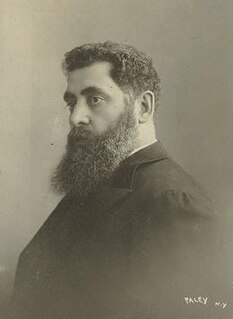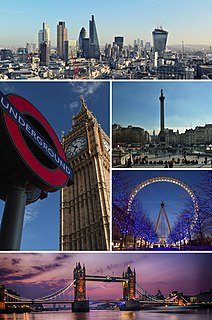
Teatrul Evreiesc de Stat in Bucharest, Romania is a theater specializing in Jewish-related plays. It is the oldest Yiddish-language theater with uninterrupted activity in the world. Its contemporary repertoire includes plays by Jewish authors, plays on Jewish topics, and plays in Yiddish. Many of the plays also feature Jewish actors.

Yiddish theatre consists of plays written and performed primarily by Jews in Yiddish, the language of the Central European Ashkenazi Jewish community. The range of Yiddish theatre is broad: operetta, musical comedy, and satiric or nostalgic revues; melodrama; naturalist drama; expressionist and modernist plays. At its height, its geographical scope was comparably broad: from the late 19th century until just before World War II, professional Yiddish theatre could be found throughout the heavily Jewish areas of Eastern and East Central Europe, but also in Berlin, London, Paris, Buenos Aires and New York City.

Abraham Goldfaden Yiddish: אַבֿרהם גאָלדפֿאַדען; was a Russian-born Jewish poet, playwright, stage director and actor in the languages Yiddish and Hebrew, author of some 40 plays. Goldfaden is considered the father of modern Jewish theatre.

Sophia Karp, born Sara Segal, she was also known as Sophie Goldstein, Sofia Carp, and Sophie Karp, was a Romanian-born Jewish actress and soprano, the first professional Yiddish theater actress.

Sigmund Mogulesko — Yiddish: זעליק מאָגולעסקאָZelik Mogulesko, first name also sometimes spelled as Zigmund, Siegmund, Zelig, or Selig, last name sometimes spelled Mogulescu — was a singer, actor, and composer in the Yiddish theater in New York City. He was born in Kalarash, Bessarabia and began singing in the local synagogue choir. Before reaching adolescence, he was paid nearly three times what teachers made, to sing in the synagogue of Chişinău. Soon after moving to Bucharest, Romania, he was paid to sing in churches as well as synagogues, and started acting.
Sokher Goldstein (c.1859–1887), first name also spelled Suher, Soher, Socher, or Sukher, was a singer and actor, one of the founding performers in Yiddish theater. A Jew, presumably of Ukrainian or Romanian origin, nothing is known about his life before Abraham Goldfaden recruited him in Iaşi in 1876 as the second actor after Israel Grodner for what became the first professional Yiddish theater troupe.

Jacob Michailovitch Gordin was a Russian-born American playwright active in the early years of Yiddish theater. He is known for introducing realism and naturalism into Yiddish theater.
Isidor Goldenberg (1870–?) was a Romanian Jewish singer and actor, prominent in Yiddish theater in the late 19th and early 20th century.
Yankev Shternberg was a Yiddish theater director, teacher of theater, playwright, avant-garde poet and short-story writer, best known for his theater work in Romania between the two world wars.
Moishe Finkel was a prominent figure in the early years of Yiddish theater. He was business partner first of Abraham Goldfaden and later of Sigmund Mogulesko and, for a time, was married to prima donna Annetta Schwartz. Together, they dominated Yiddish theatre in Bucharest in the early 1880s and in New York City in the late 1880s and into the 1890s, with a repertoire based mainly in the works of Joseph Lateiner and Moses Horowitz.
The Witch of Botoşani or simply The Witch or The Sorceress was an 1878, or possibly 1877, play by Abraham Goldfaden. Like most of Goldfaden's major works, it included music.
Ni-be-ni-me-ni-cucurigu is an 1878 play by Abraham Goldfaden. The somewhat nonsensical Yiddish title is variously translated as Not Me, Not You, Not Cock-a-Doodle-Doo or Neither This, Nor That, nor Kukerikoo; Lulla Rosenfeld says it had an alternate title The Struggle of Culture with Fanaticism. The title comes from a Russian expression "ни бе, ни ме, ни кукареку", meaning to understand nothing on the subject.
Doctor Almasaro, or The Jews of Palermo is a historical, dramatic play in rhymed couplets by Abraham Goldfaden, written some time between 1880 and 1883. The title character's name is also variously rendered as Doctor Almasado, Doctor Almaraso, and Doctor Almasada.
Itzik Manger was a prominent Yiddish poet and playwright, a self-proclaimed folk bard, visionary, and 'master tailor' of the written word. A Jew from Bucovina, Manger lived in Romania, Poland, France, England and finally Israel.
















